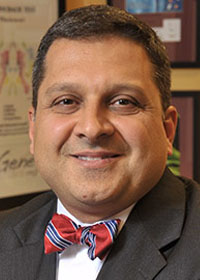Ali Shilatifard, PhD
Professor, Biochemistry and Molecular Genetics; Feinberg School of Medicine

Research Program
- Cancer Epigenetics and Nuclear Dynamics (CEND)
- Translational Research in Malignancy (TRIM)
Cancer-Focused Research
I hold the Robert Francis Furchgott Professorship and am the Chairman of the Department of Biochemistry and Molecular Genetics at Northwestern University Feinberg School of Medicine. I continue to run my own independent laboratory of 18 years, in which I have 25 research staff consisting of research professors, postdoctoral fellows, graduate students, and technicians. Many of my students and postdoctoral fellows now have their own independent laboratories throughout the world or are involved as scientists and leaders in Pharma. I have been committed to the training and career development of physician scientists, faculty on sabbatical in my lab, and junior faculty. I have had the privilege to work with M.D. and M.D./Ph.D. fellows that have trained in my lab over the last 15 years and these physician scientists have clinical expertise in diverse disciplines including Hematology/Oncology, Gynecologic Oncology, and Surgery. Also, I have been an instructor at the Cold Spring Harbor Laboratory for the four-week Gene Expression course where I teach and mentor 16 students each course, which I have been doing for the past 15 years. About 20 years ago, I identified the RNA polymerase II (Pol II) elongation factor ELL as the first translocation partner of MLL for which a function was determined. Based on this finding, my laboratory proposed that the regulation of the rate of transcription elongation by Pol II could play a central role in MLL-based leukemogenesis. Continued studies from my lab have identified some of the most frequently occurring translocation partners of MLL as components of three novel complexes: the ELL-containing Super Elongation Complex (SEC), the ELL-containing Little Elongation Complex (LEC), and DotCom, a histone methyltransferase complex. These findings suggest that MLL fusion proteins are recruited to MLL target genes within SEC or DotCom, and license Pol II to elongate without the appropriate checkpoints, leading to an unregulated expression of MLL targets. Indeed, we recently demonstrated that the wild-type MLL is destabilized in the leukemic cells. Using detailed biochemical methods and molecular screens we have identified the interleukin pathway and UBE2O regulating the stability of the wild-type MLL in the leukemic cells. Our studies have determined that the stabilization of the wild-type copy of MLL with small molecule inhibitors of the interleukin-1 pathway allows wild-type MLL to outcompete the oncogenic chimera on chromatin at key target genes, and thereby restore normal gene expression and slow tumor cell growth. We have also demonstrated that in an aggressive mouse model of MLL-r, inhibition of the interleukin-1 pathway substantially improves survival, demonstrating that leukemia is addicted to this pathway. We are now in the process of pushing this discovery into clinic for the treatment of MLL translocation-based leukemia. Therefore, the method with which we have learned considerably regarding the role of chromosomal translocations in childhood leukemia can be easily applied to the studies of SS18-SSC fusion in synovial sarcomas in collaboration with Dr. Kadoch and DhePaganon's laboratories as described in our center application and it is bound to have fundamental impact in our understanding and treatment of synovial sarcomas caused as the result of SS18-SSC translocations. I have presented over 400 invited lectures at scientific meetings and universities in the U.S. and at international institutes. I have organized over 20 international meetings on chromatin, transcription epigenetics, and cancer for the Gordon Conference, FASEB, ASBMB, Keystone Symposia, CSHL, EMBL, and Abcam. The National Cancer Institute and the National Institutes of Health have continuously supported our studies. In addition to the ongoing research in my lab, I have served my community as a member of a NIH CDF1/MGB panel from 2001-07, as a member of the Cancer Molecular Pathology study section from 2009-12, as a member of the Editorial Board of the Journal of Biological Chemistry (2002-07), and am currently as the Editor of Molecular and Cellular Biology (2007-present), as a member of eLife's Board of Reviewing Editors (2014-present), as Deputy Editor for Science Advances (2013-present), Senior Editor for Science (2015-2017), and as a member of the SAB of CPRIT (2014-present).
